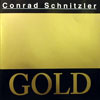 Listening to Schniztler's solo recordings from the 70s is a mixed bagbut quite good fun in several ways. It's like a time capsule, for onething—a throw back to a particular genre of relentless sequencerpatterns, modal noodlings, phasers and filter sweeps. It has theessence of a personal musical identity that influenced the people whowent on to create that genre from it. But the sound on these solorecordings shows that what Schnitzler was able to do, given the timeand opportunity, went well beyond the daily fodder of that genre. Hecould dredge a harsh grittiness from the equipment as well as delicatefinesse that doesn't fit the nostalgic idea of that warm analog soundso fetishized in recent years. The abstract pieces without rhythms workbest. Schnitzler had quite an inventive talent for composing theseevolving layers of otherworldly sounds into science-fiction concertostoo menacing to be merely psychedelic. The curious tension between thefamiliar and the novel, even with an advantage of perspective nearing30 years, highlights the unusual breadth available on Schnitzler'spallet. Where things work less well is when that pallet is applied tocreating the kind of sequencer-driven rock music that others includingTangerine Dream did too much with in the same period. The mechanicalstructures are used as a basis for soloing that just shouldn't havebeen allowed to happen. Such banal melody in the solo lines was notexactly uncommon among the electronic bands of the time. For example,Edgar Froese could throw a crowd into a tizzy of excitement just bypicking up a guitar but, let's be honest, he was never very good atplaying it. It's the same problem here. Listening from the 21stcentaury, one wonders where the sci-fi connotations come from. Were thestyles appropriated for movies and other media to then becomeconventional symbols? Is it a trick of association with the zeitgeist?Or were musicians actually aiming at making space-age sound? Anyway,fans of Schnitzler's 70s solo oeuvre will welcome this addition to theset of color albums. At the very least I can say with certainty thatthe CD booklet represents a succinct response to the problem of what todo with such a ridiculously small page format.
Listening to Schniztler's solo recordings from the 70s is a mixed bagbut quite good fun in several ways. It's like a time capsule, for onething—a throw back to a particular genre of relentless sequencerpatterns, modal noodlings, phasers and filter sweeps. It has theessence of a personal musical identity that influenced the people whowent on to create that genre from it. But the sound on these solorecordings shows that what Schnitzler was able to do, given the timeand opportunity, went well beyond the daily fodder of that genre. Hecould dredge a harsh grittiness from the equipment as well as delicatefinesse that doesn't fit the nostalgic idea of that warm analog soundso fetishized in recent years. The abstract pieces without rhythms workbest. Schnitzler had quite an inventive talent for composing theseevolving layers of otherworldly sounds into science-fiction concertostoo menacing to be merely psychedelic. The curious tension between thefamiliar and the novel, even with an advantage of perspective nearing30 years, highlights the unusual breadth available on Schnitzler'spallet. Where things work less well is when that pallet is applied tocreating the kind of sequencer-driven rock music that others includingTangerine Dream did too much with in the same period. The mechanicalstructures are used as a basis for soloing that just shouldn't havebeen allowed to happen. Such banal melody in the solo lines was notexactly uncommon among the electronic bands of the time. For example,Edgar Froese could throw a crowd into a tizzy of excitement just bypicking up a guitar but, let's be honest, he was never very good atplaying it. It's the same problem here. Listening from the 21stcentaury, one wonders where the sci-fi connotations come from. Were thestyles appropriated for movies and other media to then becomeconventional symbols? Is it a trick of association with the zeitgeist?Or were musicians actually aiming at making space-age sound? Anyway,fans of Schnitzler's 70s solo oeuvre will welcome this addition to theset of color albums. At the very least I can say with certainty thatthe CD booklet represents a succinct response to the problem of what todo with such a ridiculously small page format. Read More

